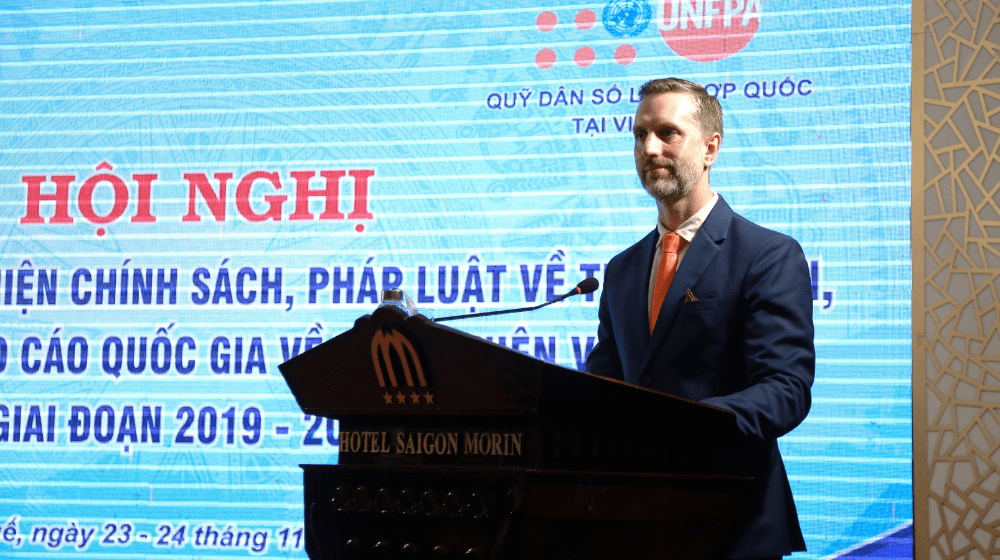- Excellency Mr Trieu Van Cuong, Vice Minister of the Ministry of Home Affairs of Viet Nam;
- Representatives from Department of Home Affairs of 19 provinces in the central region and the Central Highlands;
- Experts, and local media
Good morning, everyone,
It is my pleasure to join you in this workshop to review the implementation of the 2020 Youth Law, the national strategy on youth development 2021-2030 at sub-national level, and to discuss the draft national report on youth development for 2019 to 2022.
My appreciation goes to the Ministry of Home Affairs (MOHA) of Viet Nam for organising this workshop, and particularly to Excellency Trieu Van Cuong, Vice Minister of MOHA, for inviting me to join him to co-chair in this beautiful city. It’s a pleasure to see you again Excellency.
I am delighted to be back in Hue. I’ve only been in Viet Nam for 3 months and this is already my second visit to Hue. I am fascinated by the rich history and culture of this city under the Nguyen Dynasty.
Distinguished guests,
Vietnam is currently experiencing its highest-ever cohort of young people, presenting an opportunity known as a demographic dividend. In 2022, approximately 21 million Vietnamese youth aged 10-24, that’s about 21% of the population, signify this demographic window of opportunity which is projected to remain open for the next 15 years.
UNFPA is honoured to contribute to the Government of Vietnam’s efforts to maximise this potential. We provided technical and financial support to the revised Youth Law 2020 and the development of the National Strategy on Youth Development and will continue to support their implementation.
Our combined interventions have helped increase access to comprehensive sexuality education for both in- and out-of-school youth, as well as youth-friendly sexual and reproductive health and rights services for marginalised groups including ethnic minorities, people with disabilities. LGBTQ+ and migrant workers through multi-sectoral collaboration mechanism to ensure accountability of line ministries and local authorities.
UNFPA also supports the Government to improve data generation, especially the emerging National Youth Development Index, in line with the ASEAN youth development framework. Timely data collection and analysis at national and provincial levels contributes to evidence-based decision making and prioritising investments in young people.
Distinguished participants,
It is our investments in young people that create spaces for innovation, build life skills and support bodily autonomy.
According to a global adolescent investment case survey conducted by UNFPA in 2017, an investment of just $5 per capita each year to improve the health of adolescents will save an estimated 12.5 million lives and prevent more than 30 million unintended pregnancies. Such an investment will result in economic and social benefits that are ten times the cost – a significant return on investment. UNFPA, therefore, recommends an adequate state financial investment on youth development at all levels.
To achieve their potential, youth development needs multisectoral coordination. This workshop, organised by the Ministry of Home Affairs, already signals the Government’s political commitments to youth development in the interest of the country’s future.
UNFPA recommends that collaboration with line ministries continues to ensure that youth development indicators are fully included in action plans at the national and sub national levels. In addition, the People Committees of all provinces and cities play a crucial role in coordinating departments to allocate budgets to deliver priorities in youth development.
Provincial level platforms are very important as they create the enabling environment for young people to discuss and raise concerns on issues which affect them. Young Vietnamese people can make significant contributions to decision-making and offer unique and modern solutions that are workable for them at provincial and community levels.
We know that young people are not homogenous. There is not a one-size-fits-all solution. Therefore, each youth development policy, whether province or city, needs to reflect the specific needs of different groups of young population, such as living with disabilities, ethnic minority youth, LGBTQI+ youth and young migrant workers.
I look forward to hearing your ideas and recommendations today. Know that UNFPA stands ready to support Viet Nam to fully tap the potential of Vietnamese young people in achieving the country’s SGD targets by 2030 and to leave no one behind.
Thank you and I wish a fruitful workshop.


